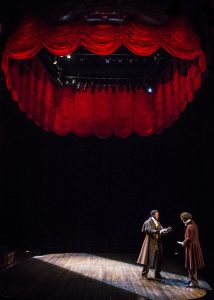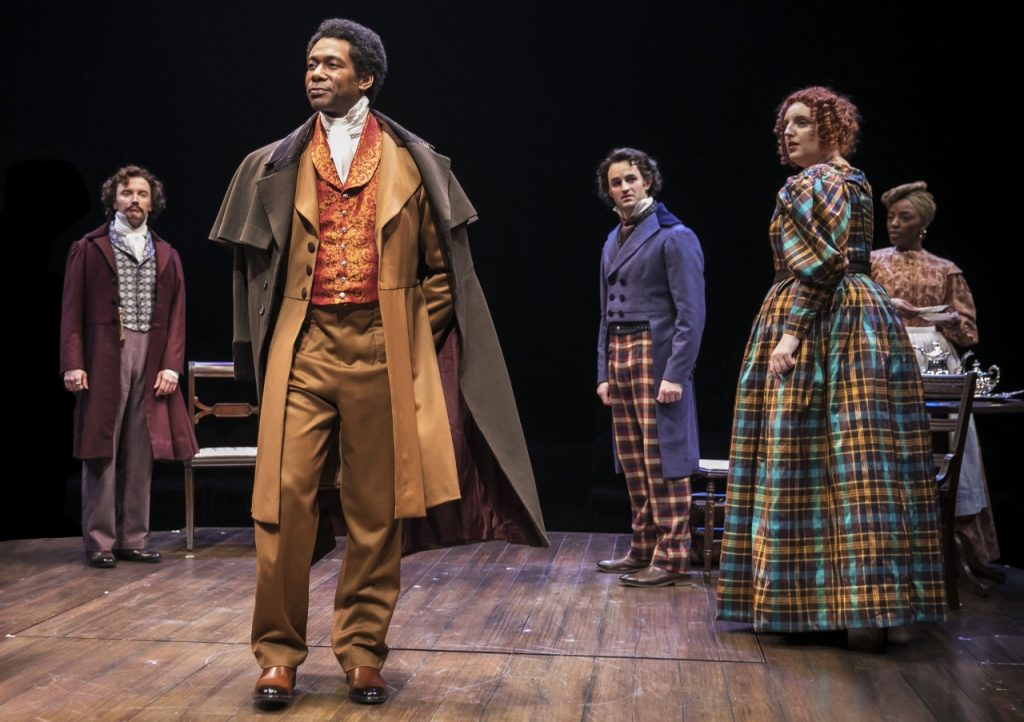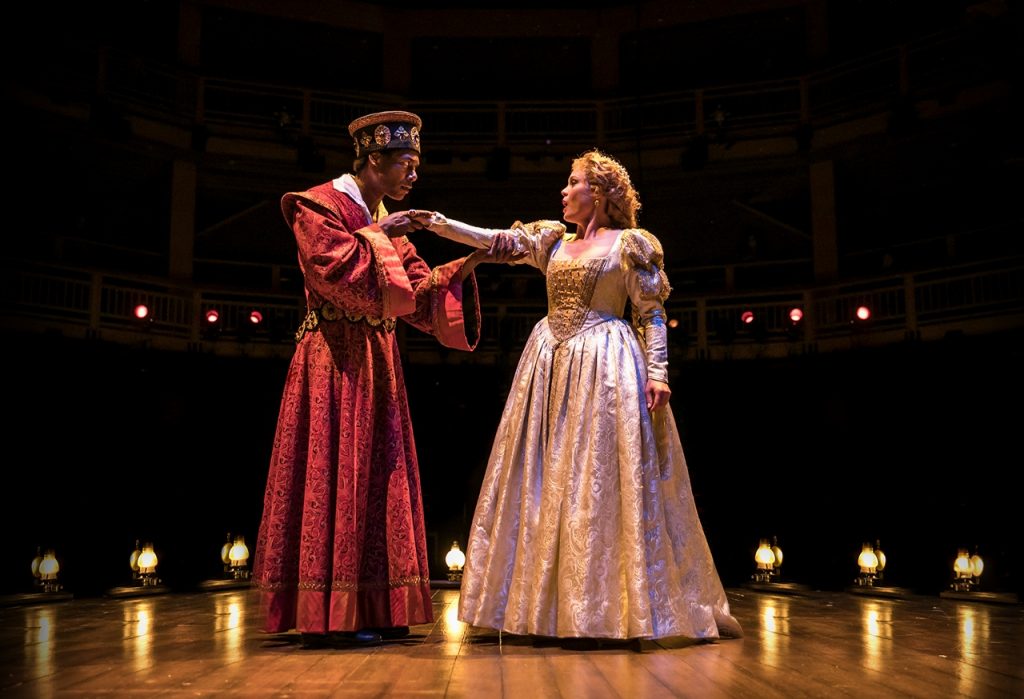BURNT BY THE TRAIL HE BLAZED
What in theater is ever off limits? And, above all, who? Besides the probability of the part, are there bounds to the roles an actor can play? Believing that merit mattered more than credentials or cachet, Napoleon promised careers open only to talent. Color-blind casting is the logical extension of this not so radical acceptance of and readiness for diversity. But the first souls to test tolerance paid a price retroactively owed by all who profit from their pain.
In Lolita Chakrabarti’s dramatic remembrance Red Velvet (the title referring to stage curtains that conceal and reveal) that flawed pioneer is Ira Aldridge. Though fairly (or unfairly) forgotten, he was theater’s Jackie Robinson. His story — a quest for artistic freedom that took him from New York to London to death at 60 in Lodz, Poland — is seen from all sides. First produced in Chicago by Raven Theatre last year, it’s now in a kinetic arena staging by Gary Griffin at Chicago Shakespeare’s Courtyard Theater.
A test of the limits of make-belief (as every play always is), Red Velvet also delivers an acid-etched depiction of the loneliness of first achievers. A force field in his own right and a blessing to the Bard, Stratford Festival tyro Dion Johnstone gives his anguished Aldridge the immediacy that history demands.
The son of free parents, this African-American apprentice actor rejected his father’s choice of religious devotion to foster a passion for the stage. That hunger would send him abroad for the rest of his life (much as Josephine Baker would later abandon a Jim Crow America for Paris). His Macbeth, Shylock, and Lear were wilder, perhaps truer, than audiences had ever felt.
Chakrabarti frames her ambivalent tribute to Aldridge with scenes of the weathered thespian, famous and embittered, on death’s door: The still-restless performer is interviewed in 1867 by an ambitious and equally underesteemed journalist (Annie Purcell). Coming full circle, at the end he puts on “whiteface” to play the now-kindred part of King Lear.
Between these bookends we see why Aldridge has become a lion in winter, raging at the notoriety that consumed him.
Enacted beneath set designer Scott M. Davis’s magnificently burnished Victorian proscenium and performed in Mara Blumenfeld’s astonishingly accurate costumes, the play turns on a pivotal point. We’re present at a creation, the night in 1833 when Aldridge briefly “replaced” renowned tragedian Edmund Kean at Covent Gardens’ Royal Coburg Theater. It was a fateful advent. This was the volatile year when the  abolition of slavery hung in the balance. The streets surged with protest. And now an actual “African” would play Othello in a world where “equal” and “opportunity” were doomed to separate sentences.
abolition of slavery hung in the balance. The streets surged with protest. And now an actual “African” would play Othello in a world where “equal” and “opportunity” were doomed to separate sentences.
With damning detail Chakrabarti presents the company’s mixed reactions to this unsought debut. Pluckily determined that the show must go on, leading lady Ellen Tree (the ever charismatic Chaon Cross) is game to do Desdemona with an authentic “blackamoor.” An idealistic abolitionist, the ensemble’s “juvenile” (Jurgen Hooper) also welcomes this serendipitous precedent. Opposed are old-school ham Terence (Roderick Peeples) and, most of all, Kean’s entitled, now jealous, son Charles (Michael Hayden). Dismissing Aldridge’s arrival as a freakish travesty, they decry this pandering “minstrel-show” gimmick that inevitably diminishes the universality of the role by taking it literally (as pointless privilege dictates, the part, Charles whines, is his to refuse).
What the troupe is not prepared for is how much Aldridge’s style is as disruptive as his skin. Though instantly at home among his fellow artists, he imperiously rejects the mannered gesticulations, sensation-seeking declamations, and portentous posing of the period. In effect he invents “method acting” on the spot.
With its deliciously catty “behind the scenes” revelations, the scene erupts into a squabble between Aldridge’s natural realism, an instinctual spontaneity that appeals to Ellen’s adventurous artistry, and the British reliance on technique over inspiration.
No storied triumph of excellence over bigotry, Aldridge’s Othello would perversely ignite and seemingly excuse the racism and condescension of London critics. But he bears blame too, brutally manhandling his imaginary white wife on stage as he never would his actual one (Purcell), a sweetly contented hausfrau. However supportive and sympathetic, theater manager Pierre LaPorte (Greg Matthew Anderson) is forced to terminate the engagement. Their flashpoint fight — Aldridge’s insisting on the supremacy of genius and LaPorte demanding that, no matter his origin, an actor must “pay his dues” to earn his place under the lights — is the play’s second cage-match debate on the right to own roles.
No Rosa Parks, a chronically defiant Aldridge never intended to advance an entire race, just his resume. But even good change exacts a terrible toll: In forging his fame, Aldridge paid crueler dues than LaPorte could imagine. At its best, Chakrabarti’s sometimes distracted and discursive script drives home the unavoidable isolation of an unintended forerunner. With Griffin characteristically extracting gold from every scene, Johnstone and eleven supporting pillars are at the top of their bent for 115 mostly memorable minutes.
Though no definitive portrait of this complex entertainer (we never see Aldridge’s anti-slavery agitation), Red Velvet does to Aldridge what Shakespeare did for Othello. Our response remains: “Oh the pity of it all!”
photos by Liz Lauren
Red Velvet
Chicago Shakespeare Theater
The Jentes Family Courtyard Theater on Navy Pier
Tues.-Fri. at 7:30, Sat. at 3 and 8, Sun. at 2 (check for alterations)
ends on January 21, 2018
for tickets, call 312.595.5600 or visit Chicago Shakes
for more shows, visit Theatre in Chicago




